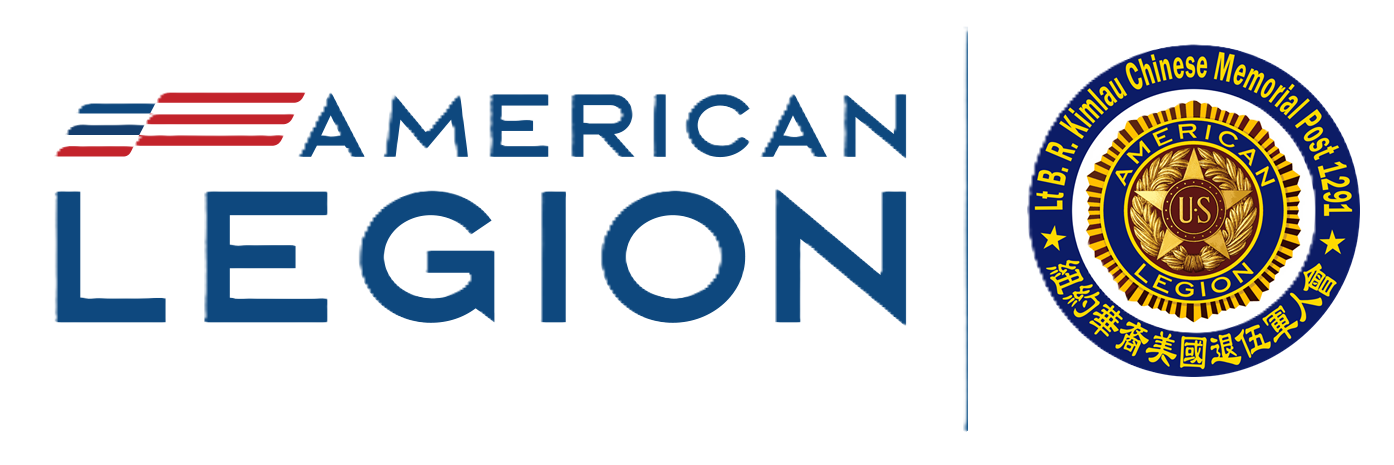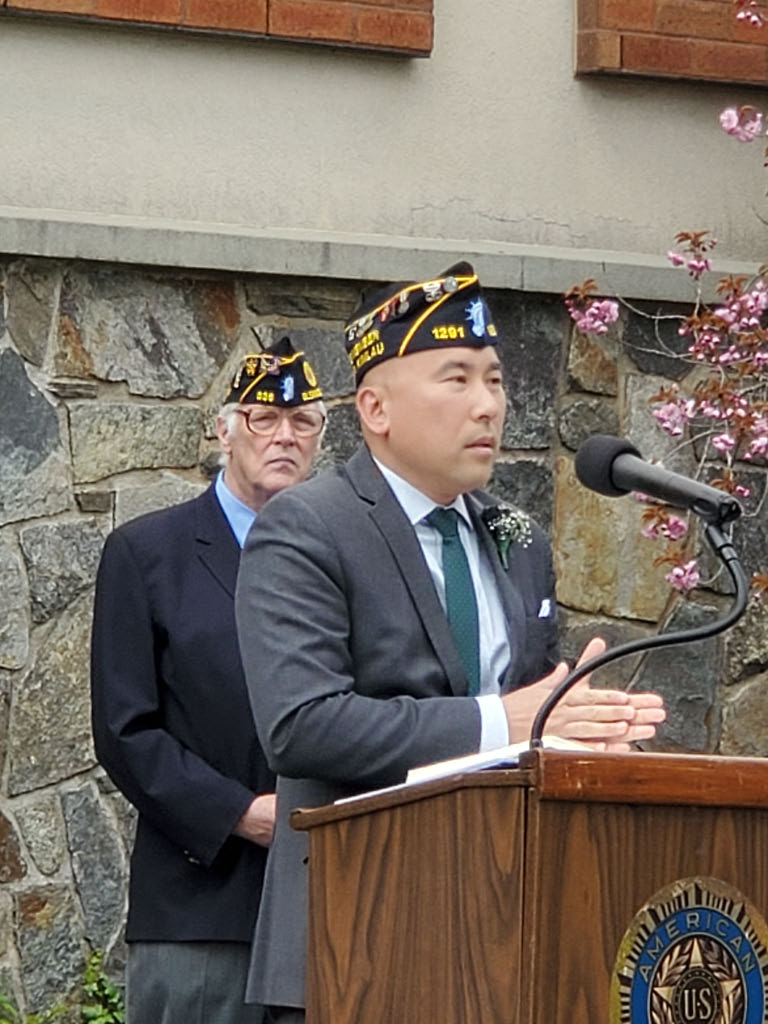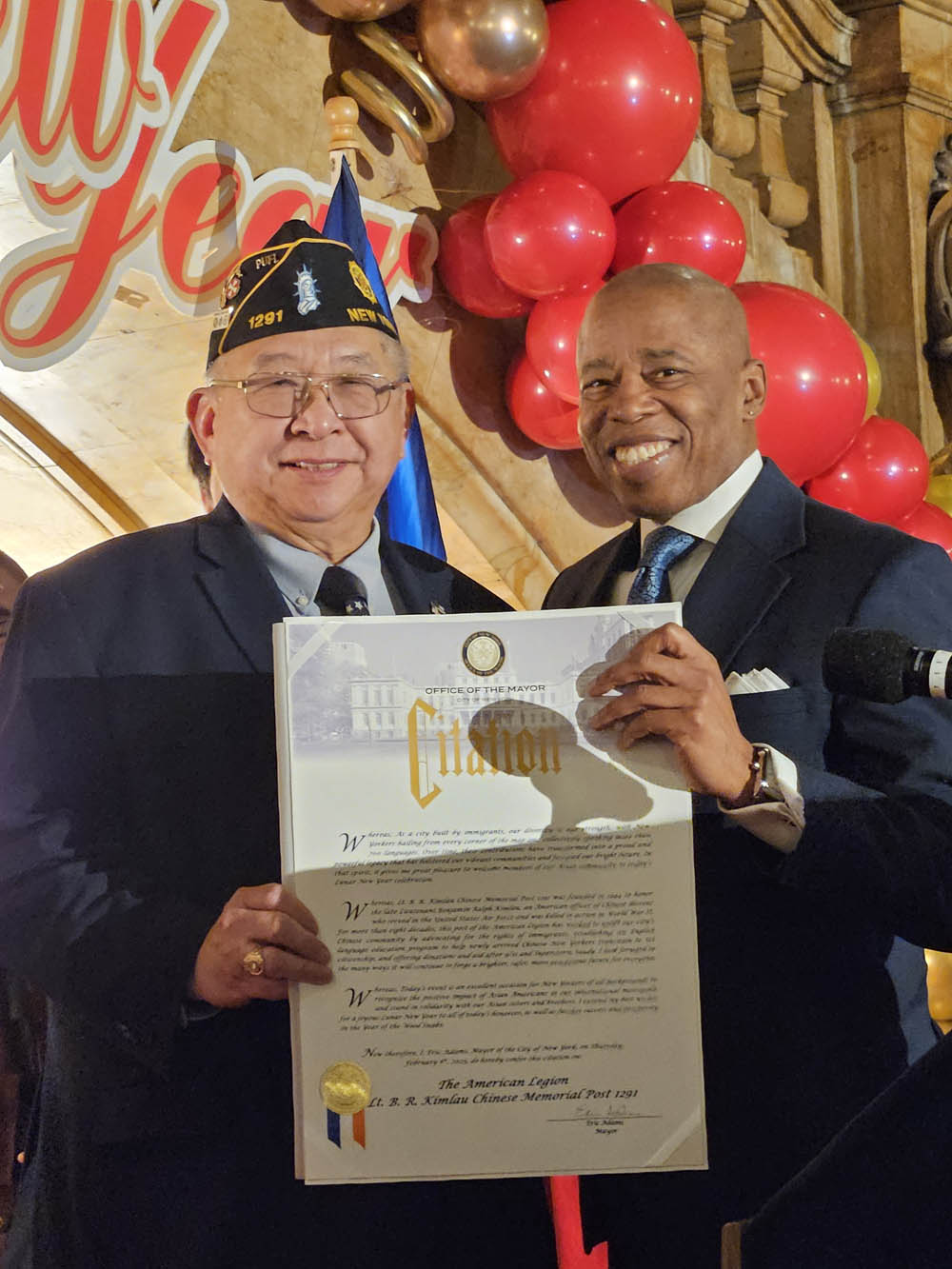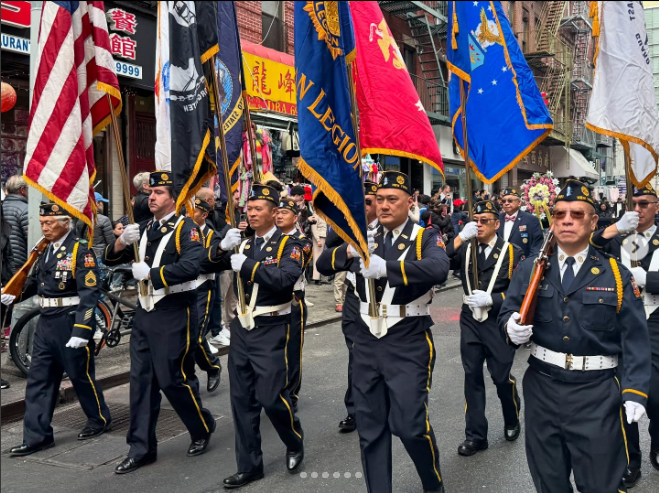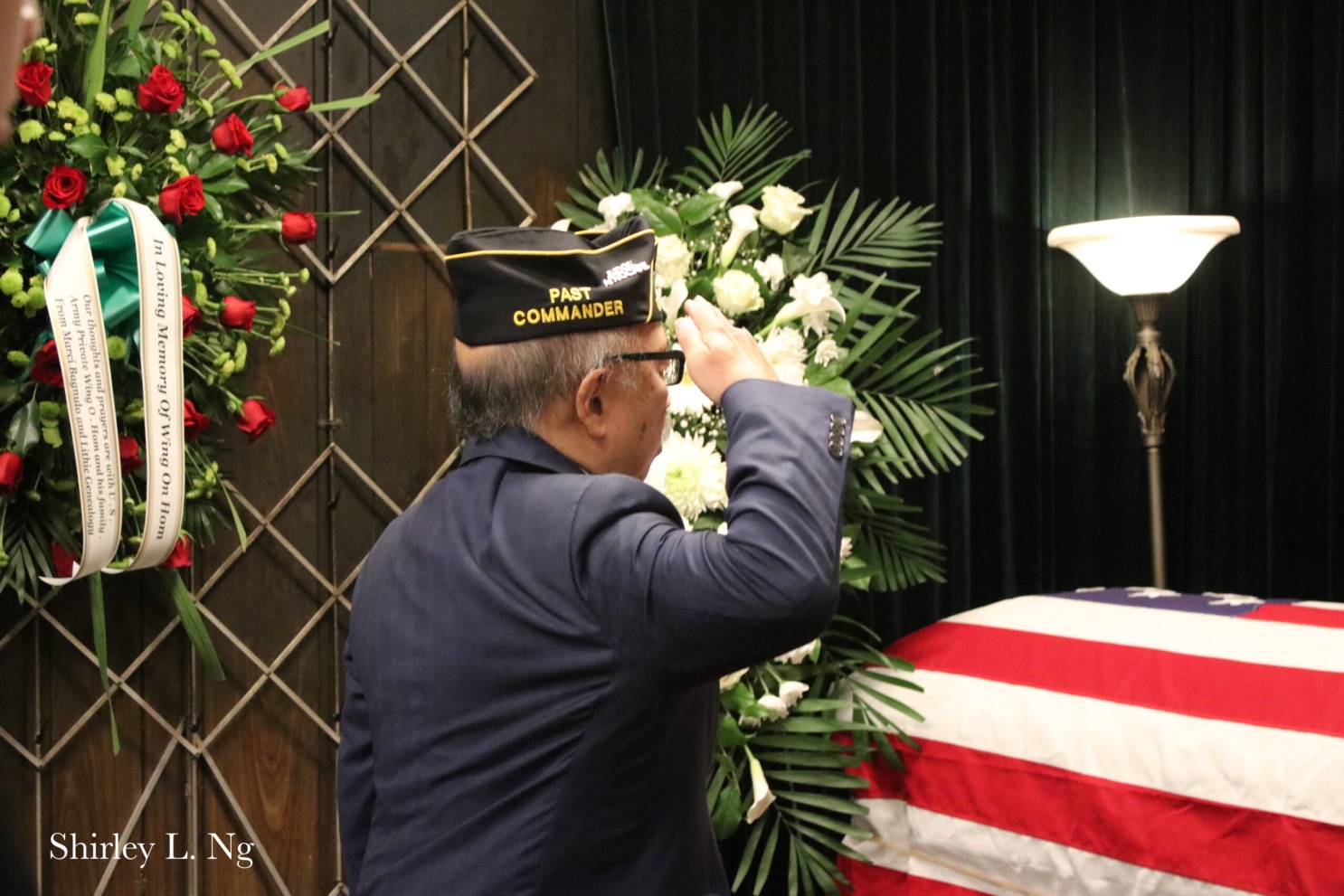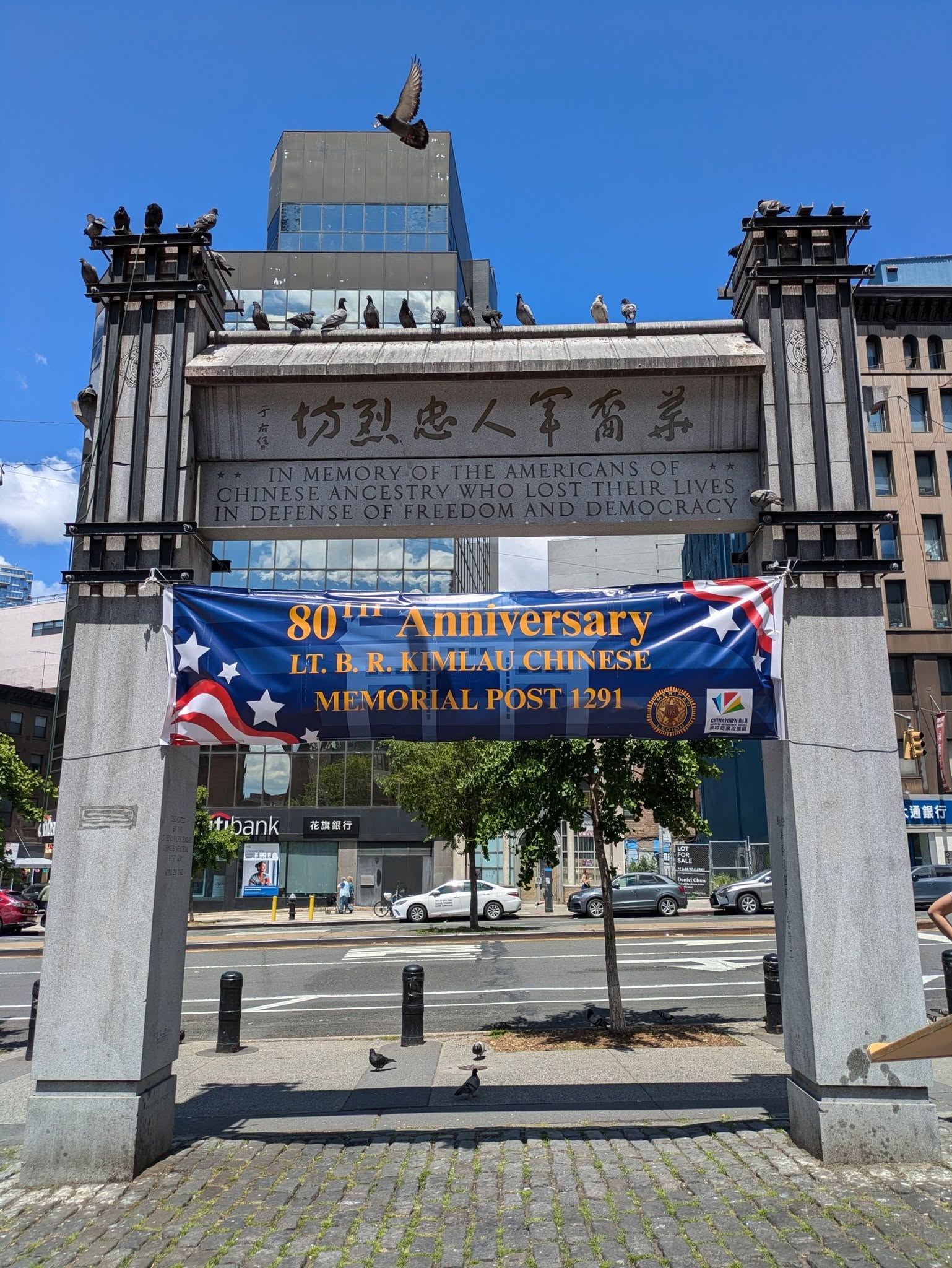My Journey with the American Legion Post 1291
By Commander Antonio Chuy
I served in the Vietnam conflict and I am proud to be a Chinese-American wartime veteran. I have always wanted to meet other Chinese-Americans who had also served our country. In 1994, I met a Chinese-American Vietnam Veteran at a party who told me he is a member of the American Legion post in Chinatown with a few hundred Chinese-American members. After I learned of the American Legion mission and what they have done to benefit active duty servicemen and veterans, I joined The American Legion Lt. B. R. Kimlau Chinese Memorial Post 1291 the following year.
I joined the American Legion for camaraderie. I never thought of being involved with any staff or executive position until I was asked to serve in the Executive Committee in 2004. Since then, I have never missed a Post meeting and have always participated every time there is a Post parade or veteran function. In 2010, I was asked to serve as one of the Sergeant-at-Arms in addition to being an Executive Committee member.
In 2016, I was elected to become one of the three Vice Commanders of the Post, supporting Commander Kenneth Wong. Since then, I have been able to get more involved with the Post’s monthly and yearly activities. Moreover, I have participated and represented my Post in all the Departments and National conferences. This Post is unique because 98 percent of the members are Chinese-American. We are located in the heart of Chinatown and are part of the Chinese-American Community. Being one of sixty member organizations in the New York City Chinatown community under the Chinese Consolidated Benevolent Association (CCBA), we are involved with a lot of Chinese events, celebrations, and programs on top of all the American Legion activities.
After two years as a Vice Commander, I was asked to run for the Commander of the Post. Although it would be an honor to serve as the Commander, I also knew it was going to put a heavy load on my shoulders and would consume much of my time.
Having been a Vice Commander of Post 1291, I knew being a leader was going to be time consuming and challenging, demanding much decision making. However; I wasn’t too concerned about the challenge being the Commander of the Post because of my past experience.
In regards to leadership, I was a Department of Correction Academy Instructor for over a decade. I provided training at all levels including recruit, officer and supervisor levels and served as a Company Commander in sixteen different companies over a span of thirteen years.
In addition, I served three 3-year terms (a total of nine years) as the President of the New York City Department of Correction Asian Jade Society, as well as one 2-year term as the President of the Supreme Council of Asians in Law Enforcement, an umbrella Asian Law Enforcement organization in New York City comprised of: New York City Police Department Asian Jade Society, New York City Department of Correction Asian Jade Society, Port Authority of New York and New Jersey Asian Jade Society, Nassau County Police Department Asian Jade Society, New York Police Department Korean Officers Association, and the Society Of Asian Federal Officers.
Moreover, I had one 2-year term of being the President of the Nom Hoy Sun Tuck Association, a friendship, charity and benevolence association for the native and descendants of the Nom Hoy County and Sun Tuck County in the Kwangtung Province, one of the sixty member organizations in the CCBA. In addition to being a leader in the law enforcement societies and a Chinese association, all the Past Commanders in Post 1291 are good long-time friends, including Chairman Peter Woo, a past commander and Chairman of the Chinese-American Veterans Memorial Building Committee (CAVMBC). They were all very supportive.
On June 2, 2018, I was sworn in as the 44th Commander of the American Legion Post 1291 and later re-elected for a second term in 2019. My two years as the Commander was as busy as I had expected. Many things had happened during the two years under my watch. There were three big incidents that I must mention.
First, The Passing of Chairman Peter Woo.
Peter Woo was a well respected Chinese-American WWII Veteran in our Post. He served in the US Army Air Corps “Flying Tigers” as a translator during the war. He was a Past Commander as well as the Chairman of the CAVMBC. During the early 1960’s, there was a need for a permanent location for our Post. The staff decided to purchase our existing location which is 191-193 Canal Street. However the Post Headquarters Association Acquisition Committee had a problem with meeting the assets required to secure a loan from the bank. The lack of assets to secure a loan became a serious issue. Believing that a permanent headquarters was critical to the Post’s long term success and ability to grow, Peter Woo stepped forward to guarantee the bank loan. His decision brought many long term benefits to the Post and its members. Because of his decision, his effort and his dedication to the American Legion Post 1291, we all now have a permanent place to meet, to accept new members, to exercise working with all levels in the American Legion’s growth and enjoy the benefit of being an American Legion member. For the past 60 plus years, Peter Woo considered Post 1291 as his second home and his second family. He came daily to the Post; talking to members of the Post, made sure everything was done right, enjoyed playing dominos on the weekend, talked to the younger generation of their active duty experience and gave us his advice when needed. Peter Woo passed away December 15, 2018 at the age of 99.
Members of the Lt. B. R. Kimlau Chinese Memorial Post 1291 consider him as a World War II hero, a legend, a patriot, a gentleman and a major contributor to the American Legion who loved his Post. He is surely missed.
Second, Participation in the Celebration of the 150th Anniversary of the Driving of the Golden Spike in Utah
America’s first locomotive made its debut in 1830. Soon railroad tracks were laid all over the East Coast between some big cities. Almost three decades later, the congressional leaders realized that there was a need to connect the east and the west for economic reasons and decided to build a railroad to connect the entire country. This act was signed by President Abraham Lincoln in 1862.
The two companies selected for the job, Union Pacific Railroad in the East Coast and Central Pacific Railroad in the West Coast began working independently laying tracks toward the center, planning to meet in the middle of the country.
In the beginning, work was slow; it took them almost two years to lay 50 miles of tracks. Five thousand workers were expected, but there were only 600 on the payroll. Then the Chinese were suggested because they already helped build the Central Pacific Railroad in the west. The Central Pacific Railroad hired 15,000 workers, approximately 12,000 or more of whom were Chinese laborers. The Chinese laborers worked long hours and were assigned dangerous tasks. They blasted and chiseled their way through the rugged Sierra Nevada Mountains using manual hammer drills, pickaxes, and explosives. To conquer the many sheer embankments, they used techniques they had learned in China to complete similar tasks. They were lowered by ropes from the tops of cliffs in baskets and while suspended, they chipped away at the granite and planted explosives that were used to blast tunnels. Many workers risked their lives and perished in the dangerous work conditions and harsh winters. Without the efforts of the Chinese workers in building America’s railroads, the development and progress as a nation would have been delayed by years.
The hard work of building the transcontinental railroad finally came to an end on May 10, 1869. The two railroad companies along with two locomotives, one from the Union Pacific Railroad and one from the Central Pacific Railroad, met each other in Promontory, Utah. During the ceremony, over a thousand people witnessed the last railroad spike driven into the ground with a ceremonial golden spike, specially made for the ceremony, connecting the East and the West.
After 150 years of the completion of the transcontinental railroad, in May of 2019, more than a dozen of our Post 1291 members traveled to Utah to help celebrate the 150th Anniversary of the Driving of the Golden Spike in Utah. They were Vice Commander Don Yee and his wife Georgiana, Past Commander Kenneth Wong and his wife Kawai, Past National Commander Fang A. Wong and his wife Barbara, Sons of American Legion President Corky Lee, Sons of American Legion member Richard Young and his wife Mel, Legion Auxiliary Secretary Karen Chan and Auxiliary members Ann Chen, Barbara Chin and Mary Lou Wu. They joined another 300 Chinese railroad workers’ descendants celebrating the 150th Anniversary in Promontory Summit, Utah.
At the 150th Anniversary of the Golden Spike Ceremony, the U.S. Secretary of Transportation Elaine L. Chao was present. During her speech, she gave a keynote address acknowledging and honoring the sacrifices and contributions of more than 12,000 Chinese laborers: “The Chinese laborers’ contributions transformed America by laying the foundation for the economic vibrancy of our nation for generations. They toiled in the rugged Sierra Nevada Mountains in conditions that were harsh, merciless, and dangerous. The Chinese workers suffered greatly with an estimated 500 to 1000 losing their lives. Their courage, dedication and sacrifices made this historic achievement possible.”
As a Chinese-American in this country, I am proud of the Chinese laborers who contributed their efforts and made this part of the American history.
Third, The Chinese-American WW2 Veterans Congressional Gold Medal
Not too many people know that Chinese-Americans participated during WWII. We neither see anything published nor do we see any Asian people dressed up in uniform in any of those documentary footage and World War II movies. In fact, there were over 20,000 Chinese-Americans serving during WWII in all five branches of military service. The majority of them were from California, New York and Massachusetts. I also met Chinese-American WWII Veterans from Michigan, Minnesota and Mississippi. Some of them volunteered for the war and some of them were drafted. In regard to the Chinese-Americans that fought in Asia or battled in Europe, they demonstrated their courage, loyalty and patriotism for our country alongside other Americans and deserve to be recognized.
The Congressional Gold Medal is one of the highest honors given in the United States for achievement and contribution. The Japanese-American Veterans and the Filipino-American Veterans who served during World War II received their awards on November 2, 2011 and October 25, 2017, respectively, but the Chinese-American WWII Veterans were yet to be recognized.
Ms. Samantha Cheng, Director of Heritage Series, initiated the Chinese-American WWII Veterans Congressional Gold Medal Bill and was later on joined by the Chinese-American Citizens Alliance (CACA). They worked together meeting with congressional leaders. On May 4, 2017, a bi-partisan legislation was introduced in the Senate. On May 12, 2018, the legislation passed in the Senate (S.1050). Within the same year, on December 12th, the U.S House of Representatives also passed the Chinese-American WWII Veteran Congressional Gold Medal Act (H.R. 2358). Finally, President Donald Trump signed into law (Public Law 115-337) on December 12th, 2018.
Since then, the U.S. Mint and the Chinese-American WWII Veterans Recognition Project worked together to design the final medal. Members of our Post 1291 volunteered their time to assist Samantha Cheng in researching old files in order to identify and notify the WWII Veterans and descendants of deceased Veterans, encouraging them to fill out applications in order to claim a replica of the medal. Post 1291 also planned to work together with CACA to host the Regional Presentation Ceremony in Washington, D.C. and New York area in the Spring of 2020. However; due to the Covid-19 pandemic, this project has been be postponed until further notice.
Special thanks for all the dedication, hard work, time and effort to Samantha Cheng, Retired Army Major General William S. Chen, the Chinese-American Citizens Alliance and the volunteers of our Post 1291 members. We are all happy to see the Chinese-Americans that fought in WWII finally get recognized.
As my journey with the American Legion continues, the last few years have been fulfilling and rewarding. I am proud to have had the opportunity to serve this wonderful Post, The American Legion Lt. B. R. Kimlau Chinese Memorial Post 1291.
